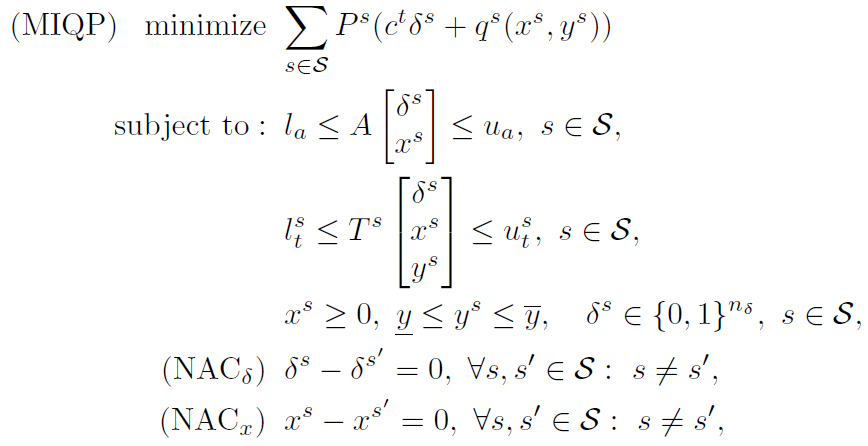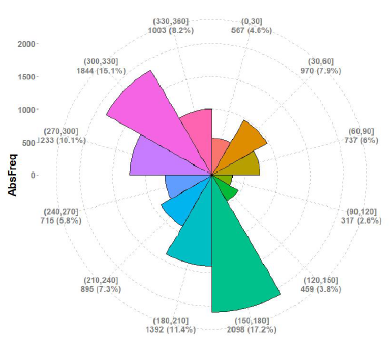stochastic programming
On the optimal participation in electricity markets of wind power plants with battery energy storage systems
Mon, 07/18/2016 - 18:43 — admin| Publication Type | Conference Paper |
| Year of Publication | 2016 |
| Authors | F.-Javier Heredia; Cristina Corchero; Marlyn D. Cuadrado |
| Conference Name | 28th European Conference on Operational Research |
| Series Title | Conference Handbook |
| Pagination | 322 |
| Conference Date | 3-6/07/2016 |
| Conference Location | Poznan, Poland |
| Type of Work | contributed presentation. |
| Key Words | research; VPP; wind generation; battery energy storage system; stochastic programming; electricity market; optimal bid |
| Abstract | The recent cost reduction and technologic advances in medium to large scale Battery Energy Storage Systems (BESS) makes these devices a real choice alternative for wind producers operating in electricity markets. The association of a wind power farm with a BESS (the so called Virtual Power Plant VPP) provides utilities with a tool to turn the uncertainty wind power production into a dispatchable technology enabled to operate not only in the spot and adjustment markets (day-ahead and intraday markets) but also in ancillary services markets that, up to now, was forbidden to non-dispatchable technologies. Even more, recent studies have shown that the capital cost investment in BESS can only be recovered through the participation of such a VPP in the ancillary services markets. We present in this study a stochastic programming model to find the optimal participation of a VPP to the day-ahead market and secondary reserve markets (the most relevant ancillary service market) where the uncertainty in wind power generation and markets prices (day-ahead ancillary services) has been considered. A case study with real data from the Iberian Electricity Market is presented. |
| URL | Click Here |
| Export | Tagged XML BibTex |
A stochastic programming model for the tertiary control of microgrids
Thu, 09/03/2015 - 10:25 — admin| Publication Type | Proceedings Article |
| Year of Publication | 2015 |
| Authors | Leire Citores; Cristina Corchero; F.-Javier Heredia |
| Conference Name | 12th International Conference on the European Energy Market (EEM15) |
| Pagination | 1-6 |
| Conference Start Date | 19-22/05/2015 |
| Publisher | IEEE |
| Conference Location | Lisbon, Portugal. |
| ISBN Number | 978-1-4673-6691-5 |
| Key Words | Microgrids; Optimization; Production; Stochastic processes; Uncertainty; Wind power generation; Wind speed; energy system optimization; microgrid; scenario generation; stochastic programming; paper; research |
| Abstract | In this work a scenario-based two-stage stochastic programming model is proposed to solve a microgrid's tertiary control optimization problem taking into account some renewable energy resource's uncertainty as well as uncertain energy deviation prices in the electricity market. Scenario generation methods for wind speed realizations are also studied. Results show that the introduction of stochastic programming represents a significant improvement over a deterministic model. |
| URL | Click Here |
| DOI | 10.1109/EEM.2015.7216761 |
| Export | Tagged XML BibTex |
Parallel Proximal Bundle Methods for Stochastic Electricity Market Problems
Fri, 07/17/2015 - 13:02 — admin| Publication Type | Conference Paper |
| Year of Publication | 2015 |
| Authors | F.-Javier Heredia; Antonio Rengifo |
| Conference Name | 27th European Conference on Operational Research |
| Conference Date | 12-15/07/2015 |
| Conference Location | Glasgow, UK. |
| Type of Work | invited |
| Key Words | research; MTM2013-48462-C2-1; mixed-integer nonlinear programming; proximal bundle methods; multimarket electricity problems; parallelism |
| Abstract | The use of stochastic programming to solve real instances of optimal bid problems in electricity market usually implies the solution of large scale mixed integer nonlinear optimization problems that can't be tackled with the available general purpose commercial optimisation software. In this work we show the potential of proximal bundle methods to solve large scale stochastic programming problems arising in electricity markets. Proximal bundle methods was used in the past to solve deterministic unit commitment problems and are extended in this work to solve real instances of stochastic optimal bid problems to the day-ahead market (with embedded unit commitment) with thousands of scenarios. A parallel implementation of the proximal bundle method has been developed to take profit of the separability of the lagrangean problem in as many subproblems as generation bid units. The parallel proximal bundle method (PPBM) is compared against general purpose commercial optimization software as well as against the perspective cuts algorithm, a method specially conceived to deal with quadratic objective function over semi-continuous domains. The reported numerical results obtained with a workstation with 32 threads show that the commercial software can’t find a solution beyond 50 scenarios and that the execution times of the proposed PPBM are as low as a 15% of the execution time of the perspective cut approach for problems beyond 800 scenarios. |
| URL | Click Here |
| Export | Tagged XML BibTex |
Contribution to the 27th European Conference on Operational Research
Fri, 07/17/2015 - 12:40 — admin The 27th European Conference on Operational Research was held in Glasgow, hosted by the University of Strathclyde, during 12-15 July 2015. I participated in the sessions with the following two works:
The 27th European Conference on Operational Research was held in Glasgow, hosted by the University of Strathclyde, during 12-15 July 2015. I participated in the sessions with the following two works:
The first one, Parallel Proximal Bundle Methods for Stochastic Electricity Market Problems in collaboration with Mr. Antonio Rengifo, a former student of our Master in Statistics and Operations Research.
The second one, entitled A multi-objective approach to infrastructure planning in the early stages of EV introduction in collaboration with the Energy Economy group of the Catalonia Institute for Energy Reseach.
A stochastic programming model for the tertiary control of microgrids
Wed, 06/24/2015 - 13:19 — admin| Publication Type | Conference Paper |
| Year of Publication | 2015 |
| Authors | Leire Citores; Cristina Corchero; F.-Javier Heredia |
| Conference Name | 12th International Conference on the European Energy Market |
| Conference Date | 19-22/05/2015 |
| Conference Location | Lisbon, Portugal |
| Type of Work | contributed presentation |
| Key Words | research; MTM2013-48462-C2-1; microgrid; stochastic programming; scenario generation; wind power |
| Abstract | In this work a scenario-based two-stage stochastic programming model is proposed to solve a microgrid’s tertiary control optimization problem taking into account some renewable energy resource’s uncertainty as well as uncertain energy deviation prices in the electricity market. Scenario generation methods for wind speed realizations are also studied. Results show that the introduction of stochastic programming represents a significant improvement over a deterministic model. |
| URL | Click Here |
| Export | Tagged XML BibTex |
Visit of prof. Eugenio Mijangos to UPC-BarcelonaTech
Fri, 11/28/2014 - 18:18 — admin
 Professor Eugenio Mijangos was visiting prof. F.-Javier Heredia at the UPC-BarcelonaTech research gropu GNOM during November 27 to 28 to start-up the tasks related with the research project FOWGEM . As a result, they are going to undertake the application of the implementation of the BFC algorithm developped by professor Mijangos to solve the multistage stochastic programming model for the multimarket optimal generation bid formulated by prof. Heredia and Dr. Corchero described in the work Efficient solution of optimal multimarket electricity bid models (Corchero, Heredia, Mijangos, DOI: 10.1109/EEM.2011.5953017). This is a previous step for the resolution of the IOGET model.
Professor Eugenio Mijangos was visiting prof. F.-Javier Heredia at the UPC-BarcelonaTech research gropu GNOM during November 27 to 28 to start-up the tasks related with the research project FOWGEM . As a result, they are going to undertake the application of the implementation of the BFC algorithm developped by professor Mijangos to solve the multistage stochastic programming model for the multimarket optimal generation bid formulated by prof. Heredia and Dr. Corchero described in the work Efficient solution of optimal multimarket electricity bid models (Corchero, Heredia, Mijangos, DOI: 10.1109/EEM.2011.5953017). This is a previous step for the resolution of the IOGET model.
Stochastic Optimal Bid to Electricity Markets with Emission Risk Constraints
Thu, 11/27/2014 - 21:20 — admin| Publication Type | Conference Paper |
| Year of Publication | 2014 |
| Authors | F.-Javier Heredia; Julián Cifuentes; Cristina Corchero |
| Conference Name | IFORS2014: 20th Conference of the International Federation of Operational Research Societies |
| Conference Date | 13-18/07/2014 |
| Conference Location | Barcelona |
| Type of Work | Invited presentation |
| Key Words | research; emission limits; risk; stochastic programming; day-ahead electricity market; combined cycle units |
| Abstract | This work allows investigating the influence of the emission reduction plan, and the incorporation of the derivatives medium-term commitments in the optimal generation bidding strategy to the day-ahead electricity market. Two different technologies have been considered: the coal thermal units, high-emission technology, and the combined cycle gas turbine units, low-emission technology. The Iberian Electricity Market (MIBEL) and the Spanish National Emission Reduction Plan (NERP) defines the environmental framework to deal with by the day-ahead market bidding strategies. To address emission limitations, some of the standard risk management methodologies developed for financial markets, such as Value-at-Risk (VaR) and Conditional Valueat- Risk (CVaR), have been extended giving rise to the new concept of Conditional Emission at Risk (CEaR). The economic implications for a GenCo of including the environmental restrictions of this National Plan are analyzed, and the effect of the NERP in the expected profits and optimal generation bid are analyzed. |
| URL | Click Here |
| Export | Tagged XML BibTex |
Two new master thesis on optimal operation of microgrids in electricity markets.
Thu, 11/27/2014 - 16:52 — admin
 On June 2014 two new Master Thesis of the Master of Statistcs and Operations Research UPC-UB was presented
On June 2014 two new Master Thesis of the Master of Statistcs and Operations Research UPC-UB was presented
Dr. Cristina Corchero (IREC) and professor F.-Javier Heredia (GNOM) were the advisors of these two works developped at the facilities of the Catalonia Institute for Energy Research (IREC).
A stochastic programming model for the tertiary control of microgrids
Thu, 11/27/2014 - 16:48 — admin| Publication Type | Tesis de Grau i Màster // BSc and MSc Thesis |
| Year of Publication | 2014 |
| Authors | Leire Citores |
| Director | F.-Javier Heredia, Cristina Corchero |
| Tipus de tesi | MSc Thesis |
| Titulació | Master in Statistics and Operations research |
| Centre | Faculty of Mathematics and Statistics |
| Data defensa | 27/06/2014 |
| Nota // mark | 10 MH (A with Honours) |
| Key Words | research; teaching; microgrids, stochastic programming; scenario generation; wind generation; day-ahead electricity market; imbalances; MSc Thesis |
| Abstract | In this thesis a scenario-based two-stage stochastic programming model is proposed to solve a microgrid's tertiary control optimization problem taking into account some renewable energy resource s uncertainty as well uncertain energy deviation prices in the electricity market. Scenario generation methods for wind speed realizations are also studied. Results show that the introduction of stochastic programming represents an improvement over a deterministic model. |
| DOI / handle | http://hdl.handle.net/2099.1/23235 |
| URL | Click Here |
| Export | Tagged XML BibTex |
Energy Management System para una microrred domestica con participación en los servicios auxiliares de red
Thu, 11/27/2014 - 16:32 — admin| Publication Type | Tesis de Grau i Màster // BSc and MSc Thesis |
| Year of Publication | 2014 |
| Authors | Irune Etxarri Urtasun |
| Director | F.-Javier Heredia, Cristina Corchero |
| Tipus de tesi | MSc Thesis |
| Titulació | Master in Statistics and Operations Reseafrch |
| Centre | Faculty of Mathematics and Statistics |
| Data defensa | 27/06/2014 |
| Nota // mark | ** |
| Key Words | teaching; research; microgrids; stochastic programming; electricity market; secondary reserve; MSc Thesis |
| Abstract | En este proyecto se ha propuesto un modelo estocástico de dos etapas para la gestión de energía en una microrred doméstica, introduciendo la participación en el mercado de banda de regulación. El objetivo del modelo es determinar la potencia que se oferta al mercado diario, teniendo en cuenta la participación en el mercado de banda de regulación. Se ha introducido estocasticidad en los precios de este mercado y en los precios y probabilidades del requerimiento a subir y a bajar de la energía de regulación secundaria. Se han comparado los beneficios de la microrred en caso de participar o no en el mercado de banda de regulación, y se ha visto que la participación en dicho mercado produce grandes beneficios para sus usuarios. |
| DOI / handle | http://hdl.handle.net/2099.1/23233 |
| URL | Click Here |
| Export | Tagged XML BibTex |
